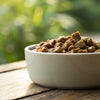Does Peanut Butter Give Dogs Diarrhea? Understanding the Risks and Benefits
- Houndsy
Table of Contents
- Introduction
- Understanding the Dog's Digestive System
- The Nutritional Composition of Peanut Butter
- Peanut Butter and Diarrhea: What You Need to Know
- Alternatives to Peanut Butter for Dogs
- Conclusion
- FAQ
Introduction
As dog owners, we often find ourselves wanting to share our favorite treats with our furry companions. One popular snack that many of us enjoy is peanut butter. Its creamy texture and rich flavor make it a beloved choice for both humans and dogs alike. However, the question that frequently arises is: does peanut butter give dogs diarrhea?
Peanut butter can be a delightful treat for our canine friends, but it also comes with potential risks that we must consider. According to veterinary experts, while most dogs can safely enjoy peanut butter in moderation, some may experience digestive issues, including diarrhea. This blog post aims to explore the connection between peanut butter and dogs' digestive health. We will delve into the nutritional composition of peanut butter, the possible causes of diarrhea, and how to safely incorporate this treat into our dogs' diets.
By the end of this article, we hope to provide you with a comprehensive understanding of the implications of feeding peanut butter to dogs, along with tips on how to do it safely. So, whether you're looking to reward your pup or make mealtime more enjoyable, stick around as we navigate this peanut butter predicament together!
Understanding the Dog's Digestive System
To grasp the effects of peanut butter on our dogs, it’s essential to understand their digestive systems. Dogs have a unique digestive tract designed to process a carnivorous diet, but they can also handle some plant-based foods. Their digestive system includes several key organs that work cooperatively to break down food and absorb nutrients.
- Mouth: The process starts in the mouth, where dogs chew their food, and saliva begins to break down carbohydrates.
- Stomach: The food then travels down the esophagus into the stomach, where it is mixed with gastric juices that contain enzymes and acids. This mixture breaks food down further.
- Small Intestine: Once the food reaches the small intestine, the majority of nutrient absorption occurs. The walls of the small intestine are lined with villi, tiny projections that enhance nutrient uptake.
- Large Intestine: Any remaining waste then moves to the large intestine, where water is reabsorbed, and the remaining material is prepared for elimination.
Understanding this process helps us recognize that any dietary changes, especially those involving high-fat foods like peanut butter, can impact a dog’s digestive health.
The Nutritional Composition of Peanut Butter
Peanut butter is a popular treat for dogs due to its nutritional content, but it's essential to examine what makes it both appealing and potentially problematic.
Key Ingredients in Peanut Butter
- Protein: Peanut butter is a good source of protein, which is essential for muscle development and overall health.
- Healthy Fats: It contains monounsaturated and polyunsaturated fats that can provide energy and support skin and coat health.
- Vitamins and Minerals: Peanut butter also contains vitamins E and B, niacin, and magnesium, contributing to a dog’s well-being.
While these nutrients can be beneficial, the high-fat content can lead to digestive issues, particularly if consumed in excess.
Potential Allergens in Peanut Butter
Although peanut allergies in dogs are rare, they can occur. Symptoms of a peanut allergy may include:
- Itching or swelling
- Vomiting
- Diarrhea
- Difficulty breathing
As responsible pet owners, it's vital to monitor your dog the first time you introduce peanut butter to their diet and consult a veterinarian if you notice any adverse reactions.
Peanut Butter and Diarrhea: What You Need to Know
How Peanut Butter Can Cause Digestive Issues
Peanut butter can cause digestive upset in dogs for several reasons:
- High Fat Content: The high-fat nature of peanut butter can lead to gastrointestinal upset, particularly in dogs with sensitive stomachs or those prone to pancreatitis.
- Additives and Preservatives: Some commercial peanut butter brands contain additives like sugar, salt, and xylitol. Xylitol, in particular, is highly toxic to dogs and can lead to severe health problems, including hypoglycemia and liver failure.
- Overconsumption: Even healthy foods can lead to digestive issues if given in excessive amounts. Too much peanut butter can overwhelm a dog's digestive system, leading to diarrhea.
Recognizing Signs of Diarrhea in Dogs
If your dog experiences diarrhea after consuming peanut butter, it's essential to recognize the signs. Common symptoms include:
- Loose or watery stools
- Increased frequency of defecation
- Urgency to relieve themselves
- Accidents in the house
If your dog shows persistent symptoms or exhibits additional signs of distress, such as vomiting or lethargy, consult your veterinarian promptly.
Factors Influencing Digestive Reactions
Not all dogs will have the same reaction to peanut butter. Various factors can influence how a dog’s digestive system handles this treat:
- Age and Size: Younger dogs and smaller breeds may have more sensitive stomachs and require careful monitoring of their peanut butter intake.
- Underlying Health Conditions: Dogs with pre-existing digestive issues or pancreatitis should avoid high-fat foods like peanut butter.
- Dietary Changes: Sudden changes in diet can disrupt a dog’s digestive system, so it's best to introduce new foods gradually.
Alternatives to Peanut Butter for Dogs
If you're concerned about the potential link between peanut butter and digestive issues, there are several safe and healthy alternatives to consider:
- Plain Cooked Meats: Chicken, turkey, and beef can be excellent sources of protein without the risk of digestive upset.
- Fruits and Vegetables: Carrots, apples (without seeds), and blueberries are nutritious options that many dogs enjoy.
- Commercial Dog Treats: Look for dog treats specifically formulated to meet your dog's nutritional needs without harmful additives.
- Yogurt: Plain, unsweetened yogurt can be a tasty probiotic-rich treat that aids digestion, as long as your dog isn't lactose intolerant.
Making Homemade Peanut Butter Treats
If you want to stick with peanut butter but ensure it's safe for your dog, consider making homemade treats. This way, you can control the ingredients and avoid harmful additives.
Basic Peanut Butter Dog Treat Recipe:
- 1 cup natural peanut butter (ensure it contains no xylitol)
- 1 cup rolled oats
- 1/2 cup whole wheat flour
- 1/4 cup water (as needed)
- Preheat the oven to 350°F (175°C).
- In a mixing bowl, combine peanut butter, oats, and flour. Add water gradually until the mixture forms a dough.
- Roll out the dough and cut it into desired shapes.
- Place on a baking sheet and bake for about 15-20 minutes or until golden brown.
- Let cool before serving to your dog.
Conclusion
In conclusion, peanut butter can be a delightful treat for many dogs when given in moderation and with careful consideration of its potential risks. While it’s generally safe for most dogs, some may experience digestive upset, including diarrhea. Factors such as individual sensitivities, underlying health conditions, and the quality of the peanut butter can all play a role in how your dog reacts to this popular snack.
As responsible pet owners, we should ensure that any peanut butter we offer is free from harmful additives like xylitol and is given in appropriate portions. If you are ever in doubt about your dog's diet or the effects of certain foods, it’s always best to consult with your veterinarian.
So, before you reach for that jar of peanut butter, consider how it fits into your dog's overall diet. And remember, whether you’re using it to reward good behavior or to make mealtime more enjoyable, moderation is key. Interested in enhancing your dog’s feeding experience? Explore our Houndsy Kibble Dispenser for a beautiful and functional solution to pet feeding that aligns with our commitment to convenience and design excellence.
FAQ
Can all dogs eat peanut butter?
While most dogs can enjoy peanut butter in moderation, some may have allergies or sensitivities. Always monitor for adverse reactions.
What should I do if my dog eats peanut butter with xylitol?
If you suspect your dog has ingested xylitol, seek immediate veterinary care, as it can be toxic.
How much peanut butter is safe for dogs?
Peanut butter should constitute no more than 10% of your dog’s daily caloric intake. Moderation is crucial.
Can peanut butter cause pancreatitis in dogs?
Yes, excessive consumption of high-fat foods like peanut butter can contribute to pancreatitis, especially in dogs with pre-existing conditions.
What are some safe alternatives to peanut butter?
Safe alternatives include plain cooked meats, fruits like apples and blueberries, and yogurt, as well as commercially prepared dog treats.









